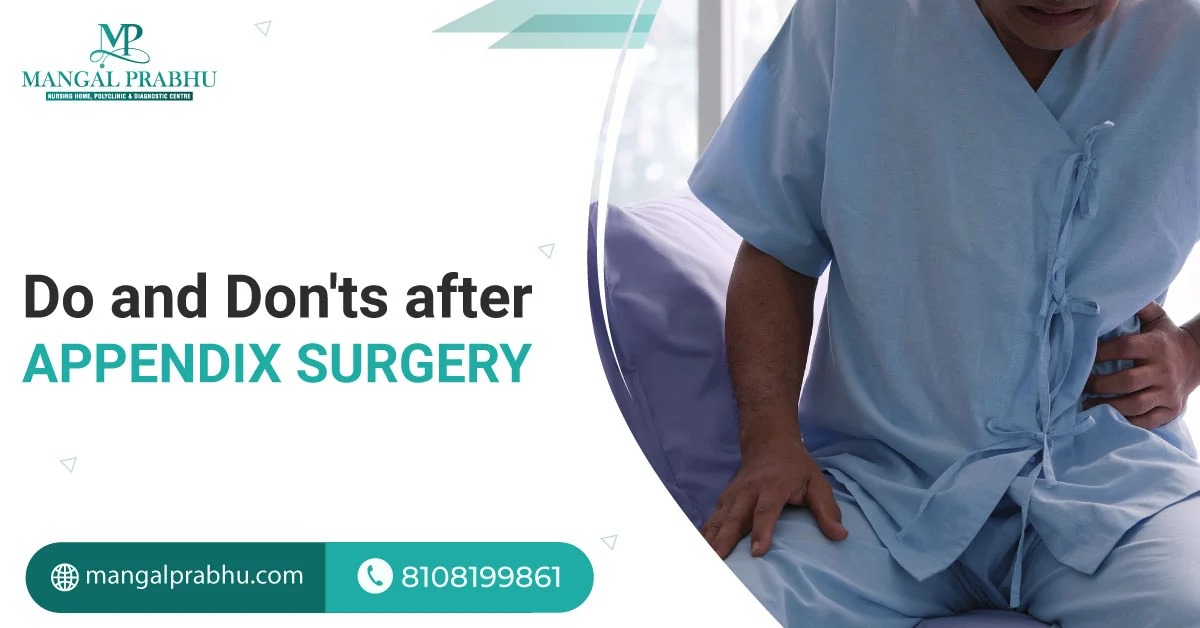
Do and Don’ts After Appendix Surgery
Located in the lower right side of the abdomen, the appendix is a small worm-like organ attached to your colon. An infection or an obstruction in the appendix can cause inflammation, requiring immediate surgical intervention. The surgery is called appendectomy and is carried out by a general surgeon in Navi Mumbai.
It’s considered an emergency in patients with a burst appendix, as the infection can spread to other parts of the body and become life-threatening. After surgery, you will stay in the hospital for a few days, especially if you had surgery for a ruptured appendix. Here are some dos and don’ts after appendix surgery for faster recovery.
Do’s after Appendix Surgery
a) Follow Your Doctor’s Instructions:
Your doctor will guide you during recovery. You may also need to schedule follow-up visits to ensure you are healing well.
b) Take Prescribed Medications:
Your surgeon will prescribe painkillers and antibiotics for the first few days. Take medication as prescribed by your doctor.
c) Maintain a Healthy Diet:
Start small with light foods, preferably liquid. Move to the soft solids, like mashed potatoes, mashed fruits, oatmeal, rice, yogurt, and scrambled eggs. Ask your doctor when it’s safe to eat normal food. Once you get the doctor’s approval, add more veggies and fruits, with proteins and omega-3 fatty acids, to your diet.
d) Get Plenty of Rest:
Like any surgery, recovery from appendectomy requires adequate rest. You should limit your physical activity and take 2-3 weeks off from work.Practice Light Physical Activity: Rest doesn’t mean you should go on bed rest and not move. Light physical activity, like walking, is an important part of your recovery after surgery. It helps prevent blood clots and other post-surgical complications.
Don’ts after Appendix Surgery
i) Avoid Strenuous Activities:
Do not put pressure on the surgical site, and avoid exercising or any strenuous physical activity for the first four weeks following appendectomy. Cycling, swimming, running, and all kinds of heavy exercises should be avoided during this period.
ii) Don’t Lift Heavy Objects:
Weight lifting should be avoided. Don’t lift anything heavier than 7-8 pounds until your doctor says it’s okay.
iii) Refrain from Consuming Alcohol:
Alcohol can delay your recovery, as it affects your immune function, increasing the risk of complications after surgery. Besides, alcohol can interfere with your pain relief and antibiotic medication.
iv) Avoid Smoking:
Likewise, smoking increases your risk of infection. It can constrict blood vessels, interfering with the oxygen supply to the tissues. This can affect post-surgical recovery.
v) Don’t Strain During Bowel Movement:
Eat a fiber-rich diet to prevent constipation. If necessary, you can ask your doctor to recommend a stool softener.
vi) Don’t Ignore Warning Signs of Complications:
If you notice pus or bleeding from the incision site accompanied by fever and vomiting, call your doctor immediately, as these might be signs of infection.
Conclusion
Recovery from appendix surgery in Navi Mumbai should take no longer than six weeks. Stay in touch with your doctor and update them about your healing. Eat small, frequent meals, stay hydrated, and sleep well.
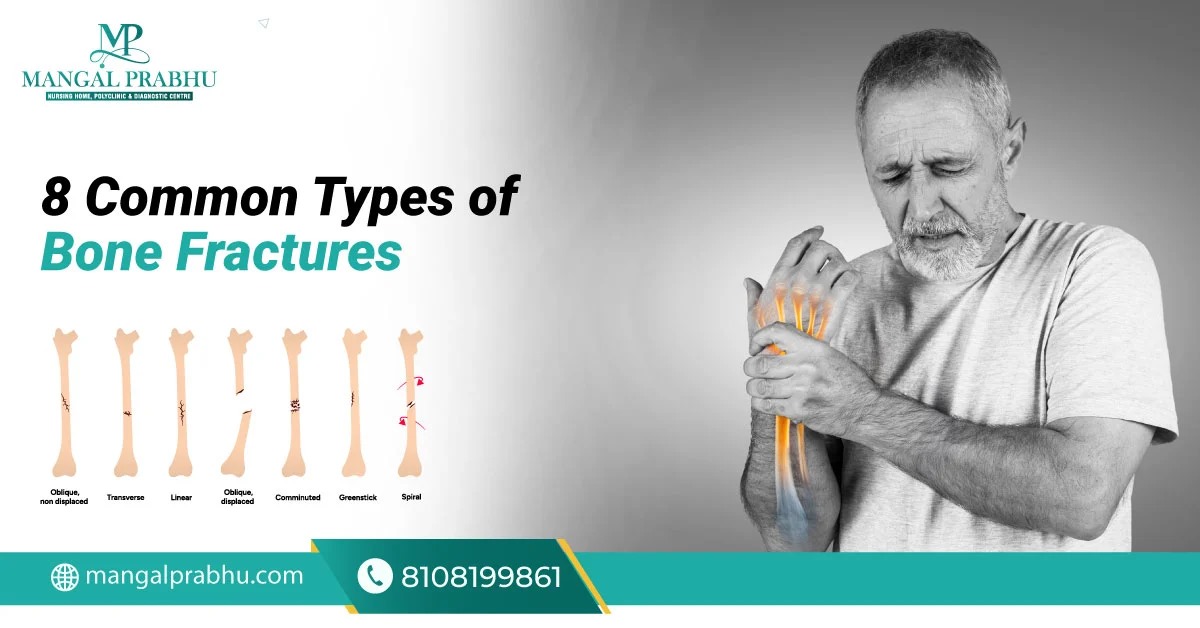
8 Types of Bone Fractures
Bone fracture refers to the broken or cracked bones. Although anyone at any age can experience a bone fracture, they are more common in older people (above 50 years). The risk is higher in people diagnosed with osteoporosis. Visit an orthopedic hospital in Navi Mumbai for bone density screening. The test detects weak and brittle bones and also suggests your likelihood of getting bone fractures. In the meantime, let’s explore the eight most common types of bone fractures.
8 Types of Bone Fractures
1) Simple Fracture
A simple fracture occurs when the bone breaks but does not cause any visible injury on the skin or break through your skin. There’s no severe tissue damage, as the bone is contained within your body. The bone might slightly displace or remain completely aligned with little damage to the soft tissue. Rest and immobilization are the most effective treatment options for simple fractures.
2) Compound Fractures
A compound fracture is more severe than a simple fracture. It occurs when the bone breaks and pierces your skin, leading to a severe wound. It’s caused by a fall from a great height or a car accident that puts excessive force on your bones, causing them to break and injure your skin. You will notice the bone sticking out of your skin and severe bleeding. See an orthopedic doctor in Navi Mumbai immediately if you notice these signs.
3) Comminuted Fractures
A car crash or other severe accident can result in your bone getting broken into many pieces. It’s another serious type of bone crack that requires hospitalization. The treatment for comminuted bone fractures is a surgical repair. The broken bones can take a year or longer to heal completely.
4) Greenstick Fractures
In greenstick fractures, your bone bends so much that it cracks slightly but does not break into multiple pieces. They result from sports injuries, falls, and other kinds of trauma. They are common in children, as children’s bones are weaker compared to adults.
5) Transverse Fractures
A transverse fracture is a bone crack that goes straight across the bone. It looks like a horizontal cut. The crack occurs from a fall or a heavy object hitting your bone. Immobilization is usually recommended for transverse fracture, but surgery might be needed if the bones’ alignment is affected.
6) Oblique Fractures
An oblique fracture is a diagonal crack, usually found in the long bones. These also occur from trauma to your bone due to a fall or an accident.
7) Spiral Fractures
Spiral fractures occur due to a sudden twisting motion, especially during strenuous physical activities or sports. These look like a corkscrew, a spiral line that goes all the way around the bone.
8) Compression Fractures
Compression fractures occur in the vertebra in your spine. They are most common in people with osteoporosis or a weakened spine, which is likely to collapse if you experience a fall, injury, or any accident that hits your spinal area.
Conclusion
Bone fractures are common and mostly occur because of trauma to your bones. These are more common in people with weaker bones (especially elders) than healthy ones. Treatment includes immobilization and surgery in severe cases.
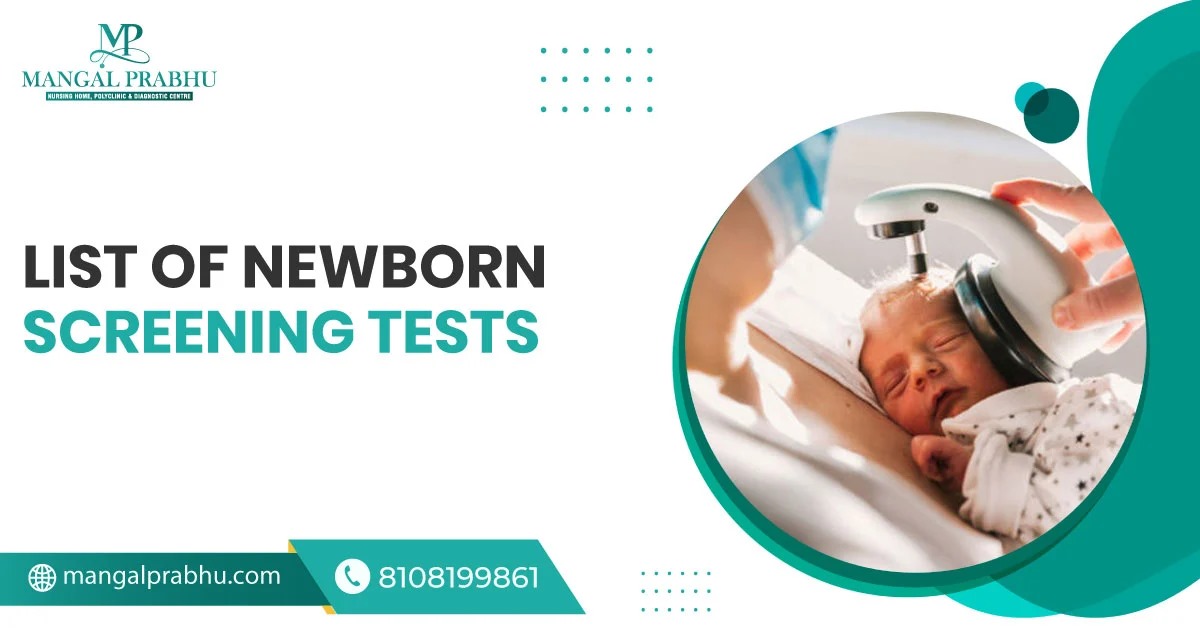
List of Newborn Screening Tests
When a baby is born, they are tested for severe yet rare medical conditions that can be fatal to the baby’s health if left undiagnosed and untreated. Your baby might not show signs of illness, so newborn screening tests are mandatory for all babies. Early detection is crucial, as it helps the pediatrician in Navi Mumbai identify problems that require medical attention.
If you are also close to your delivery date, knowing about different newborn screening tests is essential to childbirth preparation. Below, we’ve compiled a list of the common screening tests conducted at most children’s hospitals in Navi Mumbai.
Common Newborn Screening Tests
1) Hearing Screening:
The healthcare provider will use tiny microphones to detect how your baby responds to sound. The doctor connects the microphone to a monitor, which records the echo produced by your baby’s ears. The hearing test shows whether your baby has a normal hearing capacity.
2) Metabolic Disorder Screening:
Your baby will be tested for metabolic disorders before they leave the hospital. Metabolism refers to your body’s ability to convert food into energy. Problems with a newborn’s metabolism can lead to life-threatening consequences when left untreated. The healthcare provider will take a blood sample from your baby’s heel and send it to the lab for testing.
3) Critical Congenital Heart Disease (CCHD) Screening:
The pulse oximetry test is a simple test that detects heart disease in newborns. It takes barely five minutes and is performed using a sensor that detects the oxygen in your baby’s blood and pulse rate.
Conditions Detected by Newborn Screening
Newborns with metabolic disorders are unable to process foods properly. This can lead to a wide range of disorders, some of which can affect brain function and cause liver damage. Metabolism test detects problems like hypothyroidism, cystic fibrosis, sickle cell disease, Phenylketonuria, and galactosemia.
Most genetic disorders in newborns are related to their metabolism, blood function, and hormones. In addition to the above-listed issues, the test can detect Maple Syrup Urine Disease. This condition suggests your body’s inability to process certain amino acids, leading to their accumulation in the body. This may eventually result in brain damage. Spinal Muscular Atrophy is another genetic disorder that causes muscle weakness and respiratory issues.
What to Expect After Screening
If the test results are normal, you can go home. If one of the tests shows a positive, that doesn’t mean the baby has a disorder. The doctor will schedule further testing, often called confirmatory tests, to confirm the diagnosis.
If the confirmatory tests confirm the disorder, your healthcare provider will work with an endocrinologist, dietician, cardiologist, and other qualified pediatricians to plan the treatment.
Certain conditions detected in newborn screening require regular monitoring. You will be asked to monitor their developmental milestones and whether they are growing like normal babies.
Conclusion
Newborn screening tests are essential for every baby. The hospital will conduct these tests on the first or the second day of childbirth. Some hospitals send you a copy of the reports. You can have them cross-checked by your pediatrician.

10 Things a Pregnant Woman Needs
Ask any woman about their pregnancy journey, and you will likely hear different answers. Each woman has a unique pregnancy experience. Some experience severe nausea that lasts throughout the nine months, while others have a smooth pregnancy journey with no severe symptoms and fewer visits to pregnancy hospital in Navi Mumbai. To help you make the best of this time, we’ve listed the top ten pregnancy gears that every woman should include in her must-have-pregnancy-stuff list.
10 Things a Pregnant Woman Needs
1) Prenatal Vitamins
Start with folic acid. It’s mandatory for pregnant women and those planning conception. Folic acid reduces the risk of neural tube defects and congenital abnormalities in babies. Other prenatal vitamins you need during pregnancy include calcium, iron, vitamin D, Vitamin C, Vitamin B12, and more.
2) Comfortable Maternity Clothing
As your body grows, you need comfortable maternity clothing to adapt to changes, such as a growing belly and sudden weight gain. Pregnancy also brings joint pain and muscle aches. To feel comfortable, order some maternity clothes, preferably loose-stitched long gowns.
3) Hydration and Healthy Snacks
Your body’s demand for calories and vital nutrients increases during pregnancy. Increasing your calorie intake is important to support your growing baby’s requirements and keep yourself healthy. It’s equally important to drink plenty of water, around 8-12 cups a day, to stay hydrated.
4) Prenatal Care
Schedule regular appointments with your gynecologist as part of your prenatal care. They will monitor your vitals, such as blood pressure. The doctor will also order ultrasound and other tests to ensure the mother’s and the baby’s wellbeing.
5) Supportive Footwear
Pregnancy is not the best time to flaunt your brand-new spiky heels. Anything that puts you at risk of accidental falls should be avoided. You should get a couple of flats or comfortable shoes that offer proper foot support while preventing falls.
6) Rest and Relaxation
Your body needs rest during pregnancy. The physical exhaustion from increased blood volume and the growing fetus can put a lot of physical and mental stress on your body. To combat the stress, you should aim for sufficient rest. Sleep for at least 8-9 hours a day.
7) Pregnancy Pillow
Adding a pillow or two beneath your legs can help a lot. It makes your sleep a whole lot more comfortable. You can choose from c-shaped, wedged, U-shaped, and full-length pillows.
8) Exercise Routine
Many women feel intimidated by the idea of exercising during pregnancy. However, it’s important to create a proper exercise routine, practicing yoga, stretches, and basic exercises throughout the nine months. Speak with an obstetrician in Navi Mumbai to know whether starting exercises is safe.
9) Education and Resources
Getting the right book for your pregnancy and childbirth journey can help you learn a lot about what’s normal and what’s not. It also helps you prepare for labor, delivery, and post-partum care.
10) Emotional Support
Pregnancy hormones bring a significant change in your physical and mental health. It’s normal to feel stressed, mentally exhausted, and depressed at times. Spend quality time with your loved ones and practice meditation to improve your mental wellbeing. Seek professional care if your pregnancy blues get out of control.
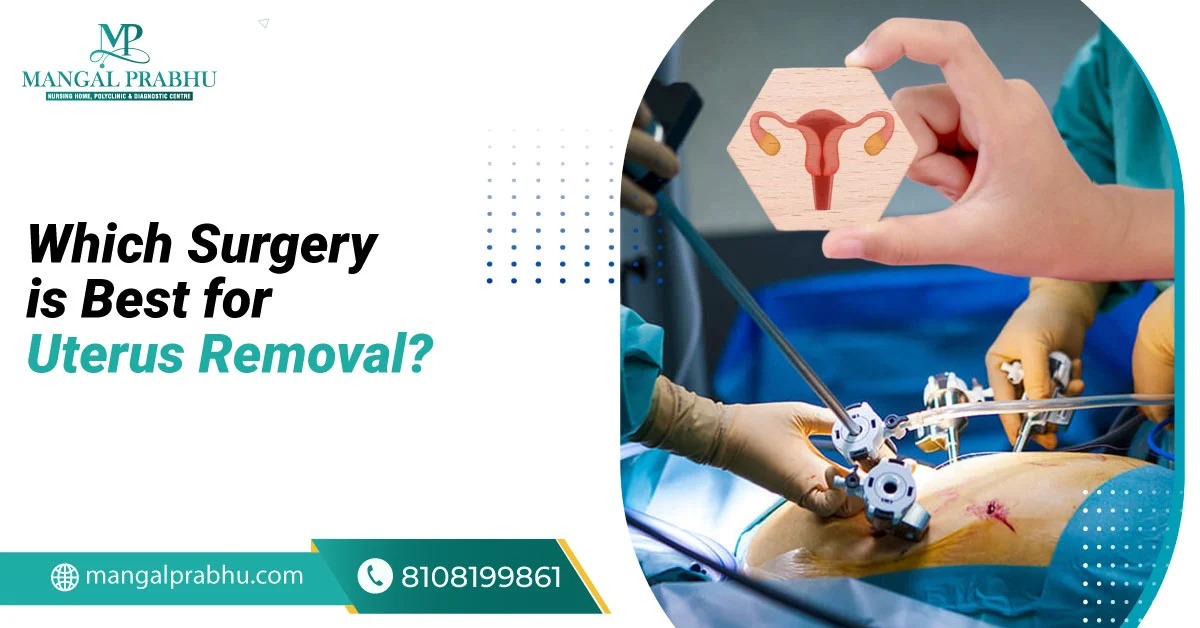
Which Surgery is Best for Uterus Removal?
Hysterectomy is the surgical removal of the woman’s uterus. It’s often considered a last resort for medical issues like endometriosis, uterine fibroids, polyps, cancer, enlarged uterus, uterine prolapse, and uterine rupture. The surgery, however, comes with potential risks. A woman can’t get pregnant without a uterus.
Moreover, if your ovaries were removed during hysterectomy, you will enter menopause immediately. Choose the best hysterectomy surgeon in Navi Mumbai and understand the different surgical methods used for hysterectomy.
Types of Uterus Removal Surgeries
1) Abdominal Hysterectomy
An open abdominal surgery is common for uterine fibroids, hyperplasia, and certain types of cancer. The surgeon makes a 5-7-inch cut either vertically or horizontally above your pubic bone and removes the uterus. If required, the doctor might perform an immediate oophorectomy (ovaries removal) and salpingectomy (fallopian tube removal).
Pros:
- It gives your surgeon a direct access to the uterus and a clear view of the surrounding organs.
- It’s effective for certain conditions where less-invasive procedures might not work.
- The doctor can easily detect any abnormality in your ovaries, fallopian tubes, cervix, and other reproductive parts during the surgery
Cons:
- Longer hospital stay
- Slow recovery
- Higher risk of post-surgical complications
- Scarring
2) Vaginal Hysterectomy
Vaginal hysterectomy is the least invasive and most preferred option for women undergoing hysterectomy. The surgeon makes a small incision on the top of your vagina and uses special instruments to detach the uterus and remove it through the vagina.
Pros:
- It’s performed on an outpatient basis, which means the patient can go home within 24 hours after the procedure.
- Fewer complications
- Quick recovery
- No scarring
Cons:
- It can lead to incomplete removal of the uterine tissues
- Infection around the incision
3) Laparoscopic Hysterectomy
A laparoscope is a thin tube with light and a camera attached to its end. A uterus removal surgery in Navi Mumbai is mainly performed with a laparoscope. The surgeon administers local anesthesia and makes small incisions on your abdomen (about half an inch). They insert a laparoscope into one of the holes, cut the uterus into small pieces, and remove it through the vagina.
Pros:
- Faster healing and quick recovery
- Fewer complications
- Shorter hospital stay
- Lower risk of infection
Cons:
- Not effective for patients with large uterine fibroids, hyperplasia, malignant tumors, and advanced endometriosis.
4) Robotic-assisted Hysterectomy
Robot-assisted hysterectomy is similar to a laparoscopic procedure. The only difference is that a robotic arm is used to perform a hysterectomy.
Pros:
- Offer greater precision
- Short hospital stay
- Fast recovery
Cons:
- Not effective for all cases
Factors to Consider When Choosing a Surgery
A vaginal hysterectomy is the best option for women who want to recover faster and get back to work within 2-3 weeks. There are fewer to no complications, and you can go home the same day after surgery. Laparoscopic hysterectomy is the second-best option. If vaginal hysterectomy is not possible due to an enlarged uterus or fibroids, or other serious issues, your doctor will advise laparoscopic hysterectomy.
The surgeon will consider the patient’s age, health status, uterus size, and previous scars when advising the hysterectomy surgery method.

Signs of Bladder Stones in Females
A combination of minerals can crystallize and form a mass in your bladder, leading to bladder stones. Some of these are small and often pass on their own through urine. Others, however, might require a surgical removal. Although it’s more common in older males, anyone, including women, can develop bladder stones.
The common signs are abdominal pain and difficulty urinating. We’ve researched the most common and less obvious yet possible warning signs of bladder stones. Let’s check out the symptoms and when to seek help from a urologist in Navi Mumbai.
Common Signs of Bladder Stones in Females
a) Painful Urination:
The most obvious sign of bladder stones in females is pain while urinating. This happens when the stone obstructs the flow of urine or irritates the bladder lining, making urination painful. The pain is exacerbated if the stones lead to an infection or inflammation in the bladder.
b) Frequent Urge to Urinate:
Stones block the urine flow, making it difficult to empty the bladder fully. This can lead to frequent urination or the urge to urinate more often than usual. The stone can also put pressure on the bladder, causing frequent urination.
c) Hematuria:
Hematuria, or blood in the urine, occurs when the stones in your bladder irritate the bladder lining, which might result in visible blood in your pee. This happens when the stones sit around for a prolonged period or grow in size.
d) Dark Urine:
Less fluid intake or the presence of blood in the urine can make it appear darker. Certain types of stone composition can also change the urine color.
Less Common Signs of Bladder Stones in Females
There are a few less obvious signs that indicate bladder stones. Although they don’t occur in every patient, it’s important to watch out for these symptoms and report them to your urologist.
A) Lower Abdominal Pain:
Bladder stones can cause abdominal pain, which can be mild or severe, depending on the size of the stone. In women, particularly, the pain might radiate to the pelvic floor muscles and the back.
B) Painful Intercourse:
In females, bladder stones can put pressure on the pelvic organs, leading to painful sexual intercourse.
C) Recurrent Urinary Tract Infections:
Bladder stones can lead to stagnant urine, in which the urine doesn’t leave your system because of the obstruction in its flow. This creates a perfect environment for bacteria to thrive, increasing your risk of catching urinary tract infections frequently.
D) Nausea and Vomiting:
If the stones have blocked a significant part of the bladder responsible for regulating urine flow, the patient might experience nausea and vomiting. That’s more common in women with UTI.
When to Seek Medical Help
Visit a urology hospital in Navi Mumbai if you experience persistent pain that gets intense in your lower abdomen. Prompt medical attention is necessary if the pain is accompanied by other bladder stone symptoms, including hematuria, difficulty peeing, high-grade fever, chills, and vomiting.
Bladder stones can grow if they remain undetected and untreated for a long time. Depending on the size and location of the stone, the urologist will either prescribe medication to pass it through urine or remove it surgically.
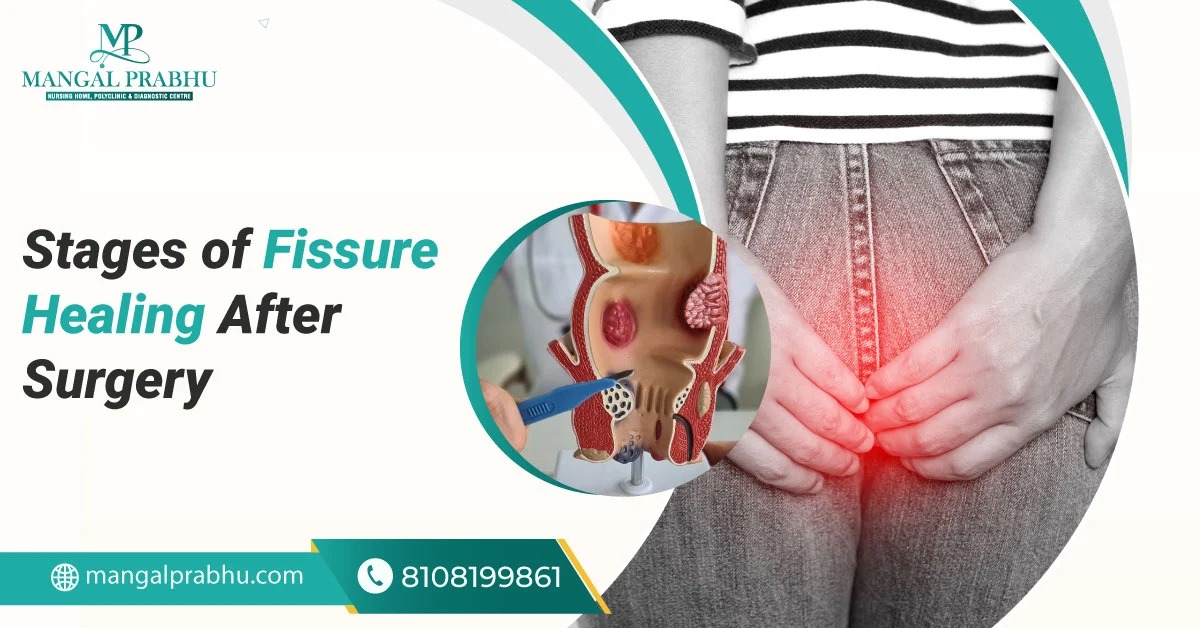
Stages of Fissure Healing After Surgery
Anal fissures are painful sores and cracks in the lining of the anus. They are common in people who experience constipation and pass large and hard stools. Anal fissures can heal on their own with natural home-based remedies, but if the symptoms don’t seem to improve within 2-4 weeks, it’s advisable to see a fissure surgeon in Navi Mumbai.
Surgical intervention might be required in some cases. If you’ve undergone surgery, it should take a week or two to recover and get back to your routine. Here are the signs you are healing well after anal fissure surgery.
Immediate Post-Surgery Phase (0-2 weeks)
i) Reduced Pain and Discomfort
Anal fissures cause extreme pain, which is like a throbbing sensation or spasms. Some people describe the pain as if the razor blade is passed through the anus. The pain is often felt after passing a stool and can last from a few minutes to an hour or longer.
The most common sign you are healing from an anal fissure surgery is the reduced pain. Some pain and discomfort, especially during and after a bowel movement, is normal, but it should start subsiding gradually.
ii) Wound Care
Your doctor might recommend laxatives to soften the stool. Wash the area with warm water using a handheld shower after passing a stool for the first few weeks. Avoid soaps and other topicals that might irritate the anus.
Early Healing Phase (2-6 weeks)
The swelling and pain will reduce drastically, making sitting and other physical activities more comfortable. If you notice increased pain, swelling, redness, and discomfort, consult your doctor immediately.
The incision site might still be red and a little tender, but inflammation should reduce, and so should any discharge. Bowel movements will be much easier.
Sitz baths can help reduce swelling and pain. To speed up healing, do them 2-3 times a day or as advised by your doctor.
Intermediate Healing Phase (6-12 weeks)
Any lingering pain should resolve within 6-12 weeks. If you had discomfort while passing a bowel movement in the initial weeks, this should go away completely. The tissue will heal by this time. Swelling will either completely disappear or get mild.
Have a fiber-rich diet to promote faster healing and ensure minimal discomfort and tissue damage during a bowel movement. Eating well and staying hydrated will ensure soft stools and a lesser risk of constipation.
Late Healing Phase (3-6 months)
Anal fissure surgery treatment in Navi Mumbai takes 3-6 months for complete recovery. You should feel normal and have no discomfort or pain on the site of the incision. You should have regular bowel movements with no fissure-related discomfort.
Regular check-ups are crucial to ensure proper healing after surgery. The surgeon will check if the area is healing well and whether there’s a sign of a fissure recurrence.
Following a healthy diet plan and keeping the area clean will speed up your healing. Stay in touch with your surgeon to see if the area is healing well. Report any unusual symptoms, such as high fever, excessive swelling, increased redness, and extreme pain, to your doctor.

Early Symptoms of Breast Cancer in Females
Breast cancer occurs when the cells in your breasts start growing abnormally. It’s one of the most common types of cancer in women all over the world. Although it mainly occurs in women, a report by the World Health Organization (WHO) shows that 0.5 to 1 percent of breast cancers affect the male population.
Like any type of cancer, breast cancer can spread to the surrounding tissues and organs, and even lymph nodes when it reaches an advanced stage. Early detection followed by breast cancer treatment in Navi Mumbai can increase your survival rates.
Early Symptoms of Breast Cancer in Females
The survival rates in women diagnosed with breast cancer have been improving. That’s primarily because people are now more aware of the symptoms, and they get prompt medical care, which improves the treatment outcome.
As mentioned above, early detection is key to getting the best treatment. Here are the initial signs of breast cancer you must watch out for:
1) Breast Lumps
The first and most common sign of breast cancer is a visible lump that may have rounded or uneven edges. You must practice self-examination to spot any lumps on your breasts. Women above 40 and those with a family history of breast cancer should get mammograms every year, even if there’s no lump or pain.
2) Changes in Breast Size and Shape
If one or both of your breasts appear considerably larger or smaller than before, that’s a sign you should see a healthcare specialist immediately. Breast cancer can cause asymmetrical breasts. Changes in the nipples and their symmetry can also be the early sign of breast cancer.
3) Skin Changes
Several noticeable skin changes on your breasts can also indicate breast cancer. The most common changes include a visible dimple-like spot on the skin, puckering and scaling, and a red rash. Some women report swelling on their breasts and near the armpits before it turns into a visible lump.
Less Common Symptoms
When the cancer reaches an aggressive stage, you might experience advanced symptoms, like a clear discharge from one or both nipples. It can be whitish, yellow, green, or bloody. Any kind of discharge from your nipples, which isn’t milk, should be reported to the doctor.
i) Inverted Nipple
If you were born with inverted nipples, that’s usually not a cause for concern. However, if you notice a sudden inversion, especially in one of the nipples, it can be a sign of breast cancer. Nipple inversion can also indicate a benign condition, though. It’s best to get evaluated.
ii) Breast Pain
Breast pain can occur from many benign conditions. Hormonal changes, puberty, onset of menstruation, menopause, and breastfeeding are a few common causes of breast pain in women. However, if it’s persistent and accompanied by other symptoms mentioned above, see a gynecologist for a thorough evaluation.
When to See a Doctor
A visible lump on your breasts with nipple discharge, pain, and swelling might indicate breast cancer. You must schedule an appointment with an oncologist in Navi Mumbai to know whether it’s a benign condition or cancer. They will order a mammogram—a breast X-ray that detects cancer and its stage.
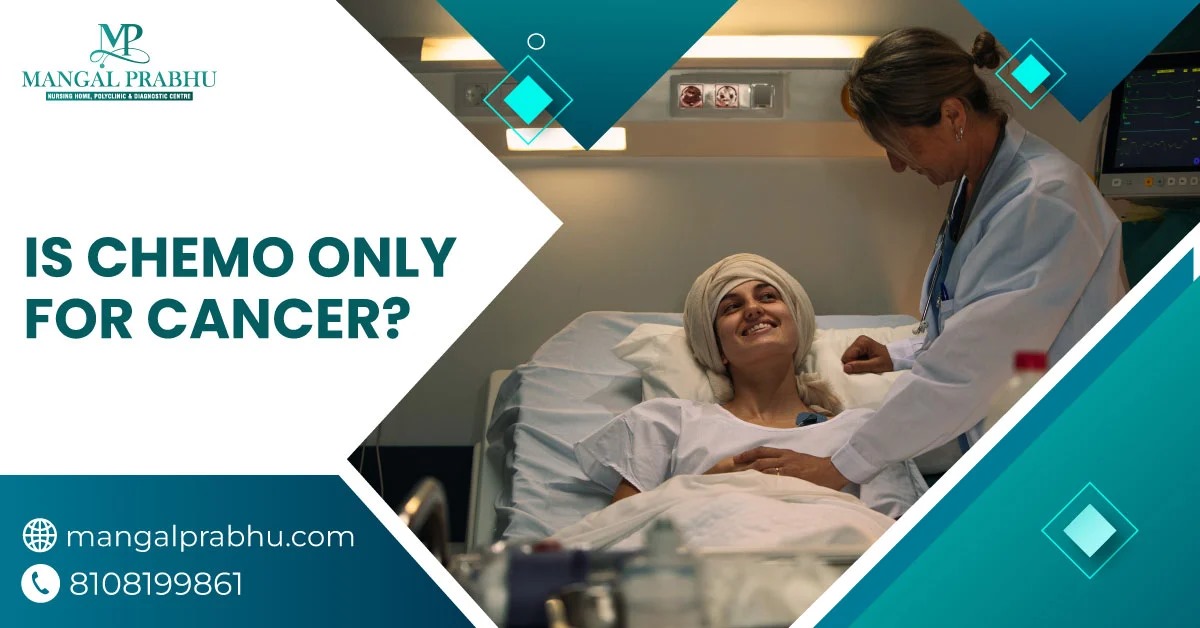
Is Chemo Only for Cancer?
What’s the first word that comes to your mind when you hear the word chemotherapy? Cancer. Chemotherapy is the most common treatment for different types and stages of cancer. Depending on the severity of the cancer, oncologists in Navi Mumbai perform chemotherapy either as a standalone treatment or in conjunction with surgery, radiation therapy, hormone therapy, and other procedures.
The question is, is chemotherapy only for cancer? No! It’s also used to treat certain autoimmune disorders and blood disorders. Let’s see what chemotherapy can treat.
Common Uses of Chemotherapy
For Cancer
More than a hundred types of chemotherapy drugs are used to treat different types of cancer. Cancer cells are known for multiplying rapidly. The initial stage of cancer is often confined to a specific organ, but it can spread to the surrounding tissues, lymph nodes, and organs if left untreated. Treatment gets harder as the cancer reaches an advanced stage.
Chemotherapy drugs kill the rapidly multiplying cancer cells. The goal of the treatment is to stop the cancer cells from growing or replicating. The number of chemotherapies required for each patient can vary depending on their cancer diagnosis and how far it’s spread.
For Non-Cancerous Diseases
Chemotherapy can be used in low doses or high doses for non-cancerous conditions, especially autoimmune disorders.
i) Autoimmune Disorders:
Lupus and other autoimmune disorders, in which your immune system attacks your organs and tissues, can be treated with chemotherapy. The therapy can suppress an overactive immune system.
ii) Bone Marrow Disorders:
Bone marrow diseases in which your bone marrow fails to produce adequate red blood cells might require chemotherapy combined with blood transfusion and bone marrow transplant. Chemotherapy is often performed before a bone marrow transplant to destroy the damaged bone marrow cells.
iii) Infections:
Some types of severe and persistent fungal infections can be treated with chemotherapy. Antifungal agents are used to offer relief to the patient. Viral infections that do not respond to the antiviral medication might also require chemotherapy, especially in patients with compromised immune systems.
Potential Side Effects of Chemotherapy
As mentioned earlier, chemotherapy kills cells that grow rapidly, which might also include the healthy cells in your gut and those responsible for your hair growth. So, side effects are not uncommon after each session. The severity of the side effects and how long they last depends on the chemo drugs you are given and the dosage. Here are possible side-effects of chemotherapy:
- Fatigue
- Hair loss
- Mouth sores
- Memory loss (also called chemo brain)
- Fertility issues
- Nausea and vomiting
- Loss of appetite
- Diarrhea or constipation
The side effects can vary from person to person. These are short-term issues that resolve on their own once the treatment stops and the new cells start to grow. Chemotherapy is also associated with long-term side effects, such as damage to your vital organs, like the heart, lungs, and reproductive system.
Conclusion
You can learn more about different types of chemotherapies and multiple methods used to administer the chemotherapy drugs into your body at the chemotherapy hospital in Navi Mumbai.
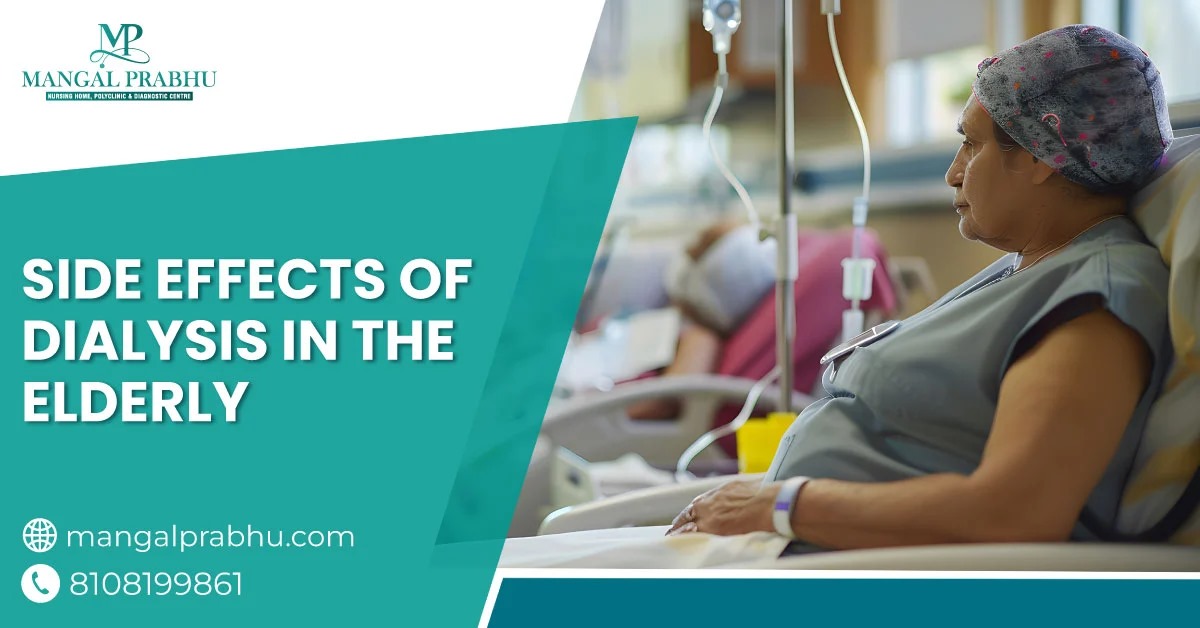
Side Effects of Dialysis in the Elderly
End-stage kidney disease requires either dialysis or a kidney transplant. While it’s a life-saving medical procedure for kidney patients, both types of dialysis procedures come with certain risks. The odds of complications are higher in the elderly.
The nephrologist in Navi Mumbai will help you weigh the risks and benefits of dialysis and offer detailed guidelines on how to manage most side effects. If you are considering dialysis but are concerned about complications, we’ve created this post that explains possible side effects and serious complications of dialysis in the elderly.
Common Side Effects of Dialysis in the Elderly
Before we dive into the side effects of dialysis, let’s understand how dialysis works.
Dialysis replicates the kidney function in people whose kidneys have stopped functioning. The procedure filters waste and fluid from the blood. Here’s what you might experience in between your dialysis sessions.
1) Fatigue and Weakness:
Dialysis can be physically exhausting, especially for elderly people with weak immune systems. Fatigue from dialysis is mainly caused by nutritional deficiency, as the process filters essential vitamins and nutrients along with waste products. Additionally, each dialysis session is pretty lengthy and may take 3-4 hours, causing fatigue.
2) Low Blood Pressure:
Too much fluid loss during dialysis can lead to a sudden drop in your blood pressure. If your blood pressure drops, you might experience additional symptoms like nausea and dizziness after dialysis.
3) Muscle Cramps:
Rapid fluid loss can cause dehydration, leading to muscle cramps. Dialysis causes electrolyte imbalance, which can result in a sudden drop in calcium, sodium, and other mineral levels. Low blood pressure can also affect blood circulation throughout the body, causing muscle cramps.
4) Itching and Dry Skin:
Skin irritation and itching are common in dialysis. Between each session, waste products build up in the blood, causing skin issues. Some people experience itching on their legs due to restless leg syndrome. Dialysis causes dehydration, which makes the skin prone to dryness and irritation.
5) Sleep Problems:
Did you know half the patients going through dialysis develop insomnia? Your kidneys filter blood regularly. However, dialysis is performed 3-4 times a week only. During this time, the waste accumulation in your body can make you feel sick. This, in turn, disrupts your sleep cycle.
Serious Complications
Dialysis can also cause long-term complications in the elderly.
- Cardiovascular Diseases: Electrolyte imbalance and excess fluid buildup can cause cardiovascular disorders, such as hypertension and heart failure.
- Infection: The regular use of catheters can cause infection.
- Malnutrition: Dialysis deprives your body of vital nutrients by filtering them with waste products, which can cause malnutrition.
- Mental Health Issues: The procedure can be mentally challenging, making the patient likely to experience anxiety and depression.
Managing Side Effects
Most of these side effects are manageable with proper medication, physical therapy, and dietary modification. Contact a professional at a dialysis center in Navi Mumbai to discuss your options, the length of treatment, and frequency.
Dialysis doesn’t have to be a permanent treatment. You can opt for a kidney transplant (if you are a good candidate) to get permanent relief.
